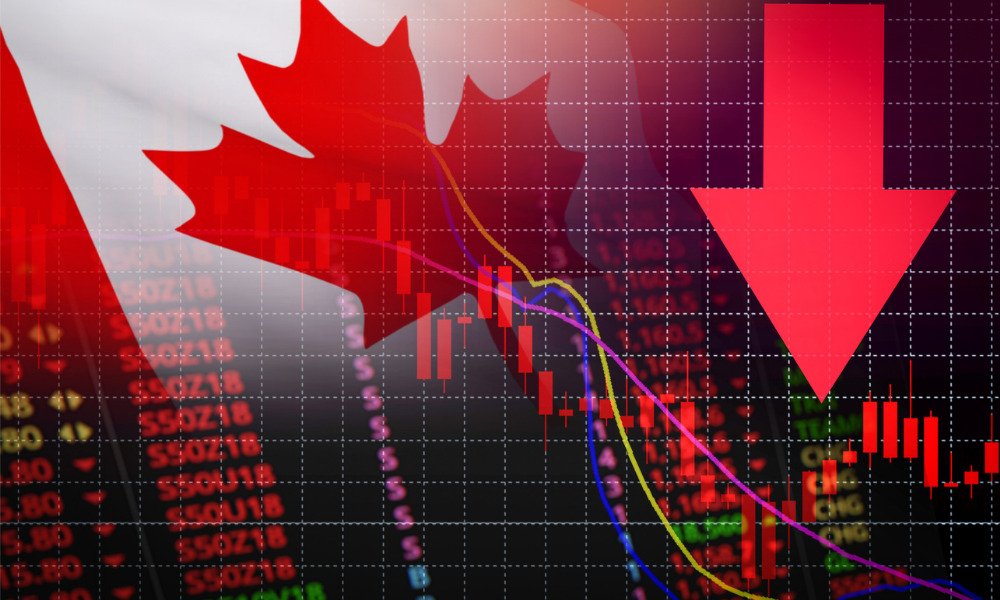One of history's most anticipated slowdowns should have less impact on markets

The deeper we move into 2023, the more the signs are pointing toward an impending recession. But, it looks as if Canada’s may be no worse than in the U.S., despite earlier concerns that it might be.
“Ever since we pencilled in a developed-world recession, we have assumed that the Canadian experience would be moderately worse than the U.S., due to additional household debt and a greater housing vulnerability to rising interest rates,” said Eric Lascelles, chief economist for RBC Global Asset Management.
“We now believe any Canadian recession may be no worse than in the U.S., for several reasons.”
Lascelles noted Canada’s surging immigration has created a larger pool of potential workers and demand for products. So, even though Canada has a chronically poorer productivity growth rate than the U.S., its demographic profile is “sufficiently superior to the U.S.” So, he assumed that it will have a faster potential growth rate than the U.S, which buffers against a deep economic decline.
Canada’s working-age population is also growing, and its commodity prices are still higher than usual, which is providing Canadian producers with more profits. It still has a fiscal deficit, but is better positioned than most other governments that have structural deficits of 4% to 7% of GDP. So, while they have to cut to avoid spiralling debt servicing costs, he said Canada does not face this
Read more: Bank stress continues, but labour trends are good
Canada’s housing market is also tentatively stabilizing. While the worst of the decline may be over, Lascelles is not convinced the new uptrend will continue. Meanwhile, Canadian households still have more excess savings from the pandemic than most countries. Its inflation is slightly lower than the U.S.’s and other developed countries, and Canada’s banks are not suffering the same stress as mid-sized U.S. lenders, so lending standards have not tightened as much, especially for business borrowers. The Canadian dollars is also still undervalued, which gives Canada a competitive boost.
“This doesn’t mean Canada can avoid a recession,” said Lascelles, “but it argues that any recession doesn’t necessarily have to be any worse in Canada than the U.S.”
U.S. Recession Likely
Still, RBC is predicting there’s an 80% chance of a North American recession during the next year.
“We have refreshed our U.S. business cycle scorecard for the latest quarter,” said Lascelles. “It continues to emit an end of cycle reading, though the ‘recession’ argument has strengthened significantly over the past year. The bottom line is that the economy appears to be old and thus vulnerable to a recession in the not-too-distant future,”
Read more: Recession risk is increasing with stubborn inflation, says chief economist
The default rate on high-yield debit is rising. The wage-growth of low-skilled works has also decelerated, so is now below the average worker’s, which he said, is “a development that usually happens when a recession is beginning.”
The San Francisco Fed’s news sentiment index is also continuing to trend down, hinting at more difficult economic conditions to come. But, North America’s job numbers are still robust with unemployment rates remaining at cycle lows. But, he said the second-tier employment indicators are still skewing more negatively. In Canada, the latest round of corporate earnings calls also reveals an ongoing shift away from ‘labour shortages’ and toward ‘layoffs’.
Credit conditions also strongly argue for upcoming weakness. Lending standards have been tightening for the past few quarters, placing the latest readings more firmly for a recession. Business lending standards now are quite tight, especially for commercial real estate loans.
Businesses also seem to see that that economic conditions are deteriorating as their demand for credit has dropped. But, bank lending standards have also tightened for consumers, even though their demand for loans has slightly increased. Lascelles said it isn’t clear whether that’s because they’re feeling more optimistic or running out of money so need credit.
While this may be one of the most anticipated recessions in history, which should allow businesses and banks to adjust, Lascelles noted the central banks are not cutting rates as they continue to try to tame inflation. But, businesses may be cutting their spending, feeding the likelihood of a recession.
“We tentatively conclude that the highly anticipated nature of the recession makes it incrementally more likely,” said Lascelles,
“But, it seems quite clear that – all else being equal – an anticipated recession should do less financial market damage as it arrives because much of the adjustment will have happened in advance. So, it could be that the effect on the stock and bond market is smaller than during the average recession.”



